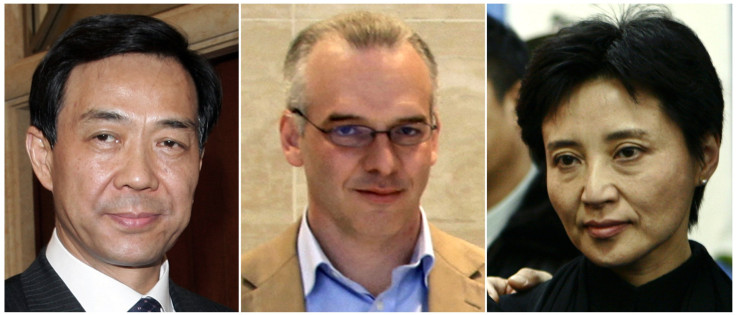China's Bo Xilai Trial Ends: Bo Claims He Is Victim Of Love Triangle Involving His Wife, Former Police Chief; Makes Fierce, Emotional Closing Statement

The trial of former Chinese leader, Bo Xilai, ended on Monday with his prosecutors demanding a heavy sentence, while Bo who denied the charges of bribery, corruption and abuse of power, blamed a love affair between his wife and a former police chief for his ordeal.
Prosecutors summarizing the case stated that Bo, a former senior member of the Communist Party and chief of the city of Chongqing, had not only committed serious crimes but also refused to accept his guilt, and demanded that he be given the toughest penalty possible by the legal system.
"Over the past few days of the trial, the accused Bo Xilai has not only flatly denied a vast amount of conclusive evidence and facts of his crimes, he has also repudiated his pre-trial written testimony and materials," the court cited the prosecutor as saying, Reuters reported.
Bo, in his 90-minute statement, defended himself by denying the allegations and questioning the integrity of the prosecution's witness and its interrogation methods. He also suggested a love affair between his wife, Gu Kailai, and his former police chief, Wang Lijun, who were the two key prosecution witnesses against him.
“Wang was secretly in love with Gu Kailai for a long time,” Bo told the court, adding that the police chief had declared his passion for her in a love letter, The Telegraph reported. “In the letter it said he had always had feelings for Kailai and he could not help himself. He even slapped himself in the face eight times.”
In his address, Bo said he brought shame to the country through his decisions, which included mishandling Wang, who reportedly informed Bo about his wife’s probable involvement in the murder of a British businessman, Neil Heywood.
Wang’s action of fleeing to the U.S. consulate in the nearby city of Chengdu in February 2012 sparked the scandal that led to the prosecution of Bo Xilai. Gu was later arrested for the murder of Heywood, and Wang was jailed last year for covering up the murder.
In his statement, Bo said he admitted to failures in managing his personal life but vehemently denied being involved in any of the crimes he was accused of by the prosecution. Instead, he accused the prosecution of acquiring evidence against him through coercion. "Even the lowest level television soap cannot have this kind of plot,” he reportedly told the court, referring to the prosecution’s closing statement.
"I know I'm an imperfect man," Bo said, according to Reuters. "I'm very subjective and bad-tempered. I have committed serious errors and mistakes ... I did not manage my family and subordinates well, I have made big mistakes and am sorry to the party and the people."
His fierce defense and revelations about his family life became hot discussion topics on Chinese micro-blogging websites, where the Chinese public, according to a South China Morning Post report, appeared to “have been convinced by his self-portrayal as an unfortunate victim of his wife’s dealings.”
The report said that hundreds of comments had appeared online, with some calling Bo “handsome” and “wise” and a “victim,” and data from Chinese search engines showed that the Chinese public’s interest had moved from Bo to Gu and their son Bo Guagua.
The trial, dubbed as the “trial of the century” in China ended at the Intermediate People's Court in the city of Jinan in Shandong province, about 440 kilometers (273 miles) away from the capital, Beijing, and 1,640 kilometers away from the city of Chongqing, which Bo once headed.
The Chinese government had touted the trial has a symbol of its intolerance toward graft, while independent observers and Bo's defense team questioned the impartiality of the legal proceedings.
Until Bo’s prosecution in February, following the conviction of his wife for the murder of Heywood, he was one of the most powerful political figures in China, and had been praised by party leaders for his administrative efficiency. And, ironically, his crusade against corruption and crime, and the reforms he brought to the city of Chongqing, had made him a popular figure in the city.
The five-day trial ended after closing statements from the prosecution and the defense, and the verdict will be delivered at a later date, expected to be sometime in September.
© Copyright IBTimes 2024. All rights reserved.






















